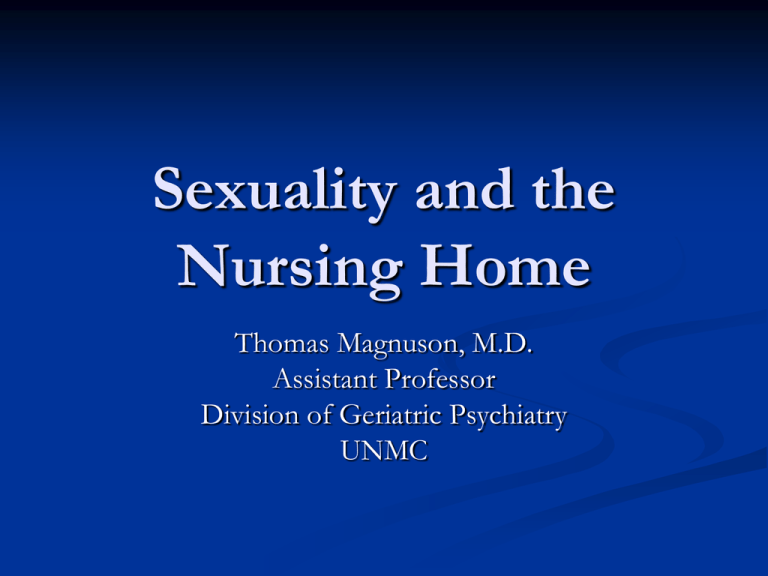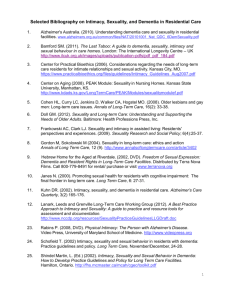
Sexuality and the
Nursing Home
Thomas Magnuson, M.D.
Assistant Professor
Division of Geriatric Psychiatry
UNMC
To Get Your Nursing CEUs
After this program go to www.unmc.edu/nursing/mk.
Your program ID number for the June 14th program is 10CE027.
Instructions are on the website.
**All questions about continuing education credit and payment can be
directed towards the College of Nursing at UNMC.**
Heidi Kaschke
Program Associate, Continuing Nursing Education
402-559-7487
hkaschke@unmc.edu
Objectives
Identify normal changes in sexuality as we age
Discuss expressions of normal sexuality in
nursing home residents
Explore assessment and treatment of
hypersexuality
Sexuality and Aging
Human drive
Other bodily changes
Mechanically less responsive
Opportunity
Diminishes with aging
Partner passes away or is ill
Cultural bias
Images of beauty, sexuality
Sexuality and Dementia
Partners must adapt to change
Degree of intimacy
Patience
Be supportive of their desire for intimacy
May alter what regarded as intimacy
May be clumsy, poorly coordinated
See as appropriate
May be less interested
Normal sexual activity may be unrealistic
May be uncomfortable, frustrating
Persons views, attitudes on sexuality may change
Case One
Elderly male with mild-moderate dementia
Wife is a daily visitor
Always pleasant and cooperative with staff
No roommate
Wife asks that a “Do not disturb” sign be placed on
the door for an hour
“…or should I lock the door?”
She clearly conveys that they will be intimate
What do you do?
Case Two
Two demented residents
How do you report this?
Serious resident-resident contact
Do they have the capacity to have sex?
Found naked in bed together
Both still married
Both assent to the behavior
One family doesn’t care
The other family is upset
What are you going to do?
Sexuality in the Nursing Home
Most still want to be sexually active
Over 60% of elderly residents endorsed a desire for intimacy
52% of men 60-69 report intercourse in the previous 4 weeks
Barriers to intimacy exist
Lack of privacy
Staff, family attitudes
Informed consent issues
Lack of a partner
Gone With the Wind
Up to now in nursing home care
Only an issue when hypersexual
Normal sexuality not on the radar screen
Like sexuality doesn’t exist
Baby boomers
Expect sexuality to be part of aging
Why do you think Viagra came out now?
Will demand the industry change
Activity therapy takes on a whole new meaning
It’s not bingo
Accommodate their needs
Long-term and short-term relationships
Lack of Privacy
Multiple person rooms
Routine interruptions
Vitals
Medications
Housekeeping
Wandering residents
State-of-the-art
New facilities will be more accommodating
Surprise!
Conjugal visit rooms
Wave of the future
Staff Responses
Variable reports
Generally positive attitudes
Some uneasy about sexual behavior
Seen as cute or disgusting
Wait until you’re 65
Leave baggage at the door
Study monitoring staff responses
Paid no notice and gave no assist
94 inappropriate sexual behaviors
Staff responded to none of them
Ignored 10/17 appropriate sexual behaviors
Kissing, hugging, caressing
Informed Consent
What is important
What form does the behavior take?
Context
Family, staff?
Risks…to whom?
Delusions another is one’s spouse?
Who initiates the behavior?
Problem…to whom?
Is it consistent with previous beliefs or practices?
STDs, exercise induced asthma?
Capacity to say no?
Informed Consent
Do they understand the relationship?
Can they avoid exploitation?
Aware of initiator
Not confused thinking of spouse
Comfortable with level of intimacy
Consistent with beliefs, values
Say no
Do they understand the risks?
Time limited nature of the relationship
How will they act when it ends?
Lack of a Partner
Many are widowed
A dearth of new partners
Angry, embarrassed
Companionship not valued
Especially for female residents
The Beach Boys were right…
Family concerns
Lack a significant other upon admission
Few activities to promote relationships
Fearful of exploitation
Institutional oversight present
Case Three
66 year old female with dementia
Mildly impaired
Found to be masturbating in her bed
Only when roommate is out of the room
No significant medical complications from the
behavior
No behavioral or psychiatric problems
Trauma from use of inappropriate objects, e.g.
What do you do?
“but I know it when I see it.”
U.S. Supreme Court Justice Potter Stewart
-commenting that pornography is hard
to define from a legal standpoint
Hypersexuality
Definition
Exposure
Obscene sexual language
Inappropriate masturbation
Propositioning of others
Touching breasts and genitalia
Hypersexuality
Behavioral problems
Common in dementia
80% of demented patients at some point
Aggression, agitation, disruptive vocalizations, etc.
Hypersexuality a rare problem
2-25%
One equal, most say more in males
Nursing home 18%
Consults 1.8%
Physical 87.8%
Verbal 65.7%
Hypersexuality
Significant issue
Resident
May require medication
May develop aggression, agitation
May have to move
Staff
Usually young females
Open communication with supervisor
Educate to recognize, manage
This adds to burden, turnover
Hypersexuality
Why does this occur?
Disinhibition
Brain areas that control impulsiveness are damaged
Mania
Delusions, hallucinations
Damage to other areas leads to delusions and hallucinations
Mistakes staff for his wife
Medications
Parkinson’s agents
Proposition, touch multiple residents, staff
Also used in restless leg syndrome
Testosterone
Given sometimes for weakness, depression
Tumor
Great increase in sex drive
Hypersexuality
Make sure you see what you see
Not all sexual acts are hypersexual
Standing with their pants down
May not remember how to get them off for bed
Frustrated aphasic patients can swear appropriately
With masturbation it is the context of masturbation
Sexual terms blurt out, but not focused
Touching your bottom
Wants your attention as you walk by his wheelchair
Reporting
Context varies reporting
What if a female pats your bottom?
What if the couple is married?
Staff member’s attitudes and beliefs
What is deemed normal varies greatly
This is a medical, not moral issue
Extent of behavior
Holding hands to intercourse
Where is the line drawn?
Case Four
76 year old male with severe dementia
Grabs caregivers breasts and genitalia
Assessment for medical causes unremarkable
No quick fix
Family embarrassed
Seen touching residents as well
Other residents’ families are angry
What do you do?
Treatment
What not to do
Ignore the behavior
Get upset
Your emotional response to the behavior has a great deal
to do with making it better or worse
Tell them it is “inappropriate”
Really…it won’t go away
If they knew that…
Send mixed messages
Kisses, hugs, holding hands
Treatment
Nonpharmacologic
We must change our behavior to the resident
Return to room, close the door
Move to another unit, hallway
Use same sex staff members
Appropriate except for place
Separate resident from the target
They cannot learn
Especially bathing, dressing, toileting
Prevention
Activities
Clear identification as a medical professional
Treatment
Pharmacologic
Usually start with an SSRI antidepressant
A side effect
Reduces sex drive
Mechanical problems
Prozac (fluoxetine)
Zoloft (sertraline)
Paxil (paroxetine)
Luvox (fluvoxamine)
Celexa (citalopram)
Lexapro (escitalopram)
Treatment
SSRI antidepressants
What to watch for
Nausea and/or diarrhea
Jittery
Insomnia/sedation
Headache
Low sodium
Rare GI bleed
Treatment
Pharmacolgic
Hormone treatment
Cyproterone and depo-provera
Estrogen
Testosterone and LH levels
Oral and IM
Daily dosing
Oral, patch
Leuprolide
IM monthly
Treatment
Hormone treatment
What to watch for
Thromboembolism and stroke
Depression
Bone density loss
Weight gain
Hot flashes and gynecomastia
Fatigue
Treatment
Others
Exelon (rivastigmine)
Tagamet (cimetidine)
Neurontin (gabapentin)
Clomipramine
Cases
Case One
Normal behavior
Assure privacy, dignity
Case Two
Assess competency
Be aware of family concerns
Risks and benefits include mood, QOL issues
Cases
Case Three
CLOSE THE DOOR!
Case Four
Begin nonpharmacologic interventions
Provide as much information as possible to PCP
Make sure all staff is trained in assessment and
interventions
Communicate with families
Need for education, reassurance
Objectives
Identify normal changes in sexuality as we age
Discuss normal expressions of sexuality in
nursing home residents
Explore assessment and treatment of
hypersexuality










